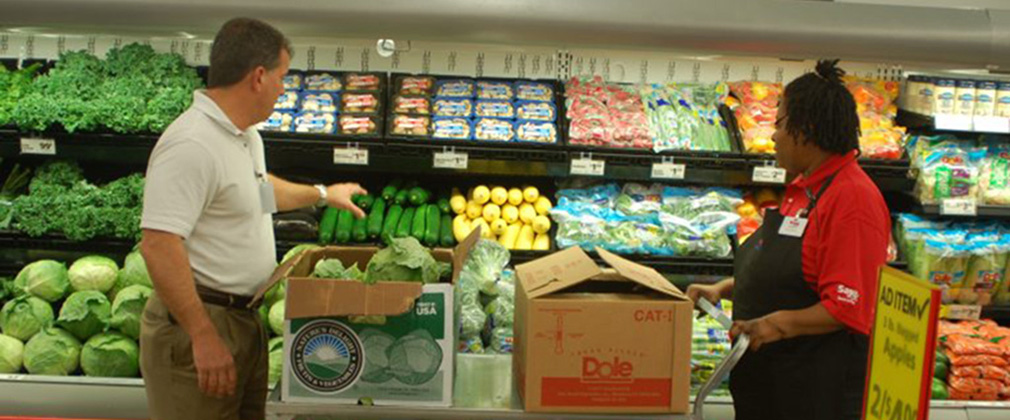Policy in Action: Bringing a Grocery Store to East Baltimore
Have you ever considered getting up before dawn to stand in line for a new grocery store? Residents in East Baltimore did just that on November 3, 2016, to welcome the Save a Lot opening at 2509 East Monument Street. The line to enter the store extended down the block and around the corner well before the store was scheduled to open at 7am.
This area of East Baltimore was one of the most entrenched food deserts in the city before the Save a Lot opened. It had been years since anything resembling a real grocery store was available in the neighborhood, and excitement for the new store was palpable. Grocery stores opening anywhere create buzz, but a store opening in a food desert is cause for celebration. Why? Because attracting a store to a food desert represents many unique challenges.
Of the 12,000 residents in this community, nearly half live at or below 185 percent of the Federal Poverty Level and 37 percent of the residents do not have access to a vehicle. Their only option is to walk to one of 16 corner stores—only one of which offers fresh food. Availability of those fresh items varies greatly. This new Save a Lot brings a steady supply of fresh and staple foods at affordable prices to this community, along with 24 new jobs. In addition, this Save a Lot anchors a bustling commercial corridor of some 100 businesses along East Monument Street starting at the Northeast Public Market on the 2100 block.
The story of Save a Lot’s opening illustrates the best of inter-City agency collaboration and a partnership with an educational institution coming together to create solutions that address health, economic and environmental disparities. That effort is the Baltimore Food Policy Initiative (BFPI).
BFPI began almost six years ago as an intergovernmental collaboration between the Department of Planning’s Office of Sustainability, Baltimore Health Department and my organization, the Baltimore Development Corporation (BDC). Each agency applies their expertise to help eliminate food deserts. A key to this collaboration is our partnership with the Johns Hopkins Center for a Livable Future (CLF), which provides us with research and data such as the Food Environment Map and Report. BFPI brought resources and attention to the pressing community issue of how a lack of access to fresh, healthy food contributes to health disparities among Baltimore’s most disadvantaged populations.
Early on, BFPI partners used in-depth analysis, interviews with retailers, and promising models from other cities to understand the barriers that prevent grocery retailers from operating in food deserts. This analysis revealed a fragmented grocery industry, with high overhead costs and perishable products all contributing to razor thin profit margins of one or two percent. Layer on top of that challenges specific to operating in food deserts such as security, high staff turnover and higher taxes and fees in the city, and retailers have a tough time making a store in these areas profitable. It became clear that meaningful financial incentives would be necessary to attract quality supermarkets where they are most needed in Baltimore. With this understanding and by looking at promising models from elsewhere, BFPI developed a comprehensive agenda known as the Food Desert Retail Strategy that partner agencies are working to implement. Read more about the strategy here.
One of the strategies addresses a critical obstacle to bringing grocers to food deserts—Baltimore’s personal property tax rate. This tax rate, at 5.62, is more than double the rate in Baltimore County. Personal property is typically anything moveable that is not real property and has a useful life of more than 12 months. Washington, DC’s Supermarket Tax Exemption Act of 2000 and NYC FRESH were two successful models incentivizing supermarkets to locate in areas of high need, and we looked to those models to develop legislation to enact the Food Desert Incentive Area Personal Property Tax Credit.
The tax credit, passed early in 2016, seeks to relieve some of the tax burden for grocers and increase profitability, thereby incentivizing underserved areas. The Save a Lot on East Monument Street is the first store in Baltimore City to receive the tax credit. The credit, along with brownfields and façade improvement grants provided through BDC, contributed to the redevelopment effort.
The tax credit does not apply to all grocers, only those that locate or significantly renovate in a defined Food Desert Retail Incentive Area. To qualify, stores must meet a minimum level of investment and requirements for floor space dedicated to produce and perishable goods to ensure that they will serve as true sources of fresh, healthy food. Qualifying stores receive 80 percent off their personal property tax bill for 10 years. This credit is meaningful cost relief for stores that often pay tens of thousands of dollars or more in personal property tax each year.
The Save a Lot on East Monument St demonstrates how government and academia can work together to translate data into policy action. The CLF and BFPI continually move an already productive agenda forward through a shared mission to ensure fresh, healthy, affordable food access for all residents of Baltimore.
Thank you the CLF staff who joined us that day for the opening! Your partnership with BFPI is the underpinning of our success in communities.
